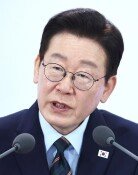Korea Sees Trade Deficit in 11 Years
Korea Sees Trade Deficit in 11 Years
Posted June. 30, 2008 03:04,
The rapid jump in the international oil prices has raised the possibility that Koreas trade balance will record the first deficit in 11 years not only in the first half of this year but in the entire year.
According to the Ministry of Knowledge Economy and the Korea Customs Service Sunday, Korea exported $198.84 billion and imported $209.52 billion, resulting in a trade deficit of $10.67 billion between the beginning of this year and June 20.
The worsening of trade balance has been attributed to the soaring cost of imported crude oil amid the skyrocketing international oil prices.
Although Korea imported less oil from January to May, the cost of imported oil stood at $35.17 billion, a 58.9 percent rise compared to the same period last year.
Accordingly, the government is expected to modify its prognostication of trade balance from surplus to deficit.
Presupposing that the annual average price of Dubai crude this year would be $71 per barrel, the government, at the end of last year, predicted that trade this year will record a surplus of $13 billion. The price of Dubai crude, however, hit a new high of $130 per barrel Friday.
If a trade deficit occurs this year, it would be the first time in the past 11 years since the deficit of $8.45 billion in 1997, the year when the foreign exchange crisis broke out.
Meanwhile, the possibility of recession in the domestic economy caused by such high oil prices, the anxiety over the prolonged illegal anti-government rallies and the summer strikes by the labor unions are quickly eating away business sentiments.
The Federation of Korean Industries said Sunday that the result of its latest poll on the Business Survey Index (BSI) for July this year turned out to be 83.2, the lowest in the last 41 months. Some 552 companies out of the biggest 600 Korean companies participated in the poll.
When the BSI is above 100, it means that there are more companies predicting that the economy will improve. When it is below 100, it indicates the opposite sentiment.
The Korea Economic Research Institute also predicted that the actual GDP growth in the second half of this year will be 3.3 percent, far lower than that of the first half (5.2 percent), leading to an annual growth rate of 4.2 percent.
Since stagflation, which usually accompanies economic recession and inflation, is likely to arise in the second half of this year, price stabilization should be put on the top of the policy priority list, the institute said.
cha@donga.com



![[단독]폴란드, 韓 해군 최초 잠수함 ‘장보고함’ 무상 양도 안받기로](https://dimg.donga.com/c/138/175/90/1/wps/NEWS/IMAGE/2026/02/27/133437397.1.jpg)
![‘노인 냄새’ 씻으면 없어질까?…“목욕보다 식단이 더 중요”[노화설계]](https://dimg.donga.com/c/138/175/90/1/wps/NEWS/IMAGE/2026/02/27/133434557.3.jpg)


